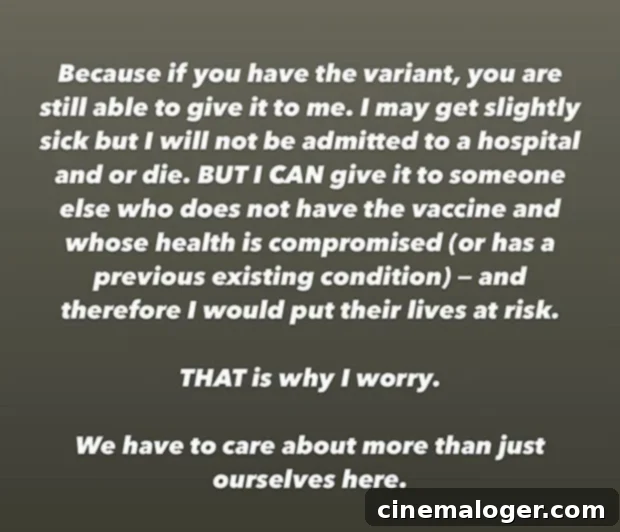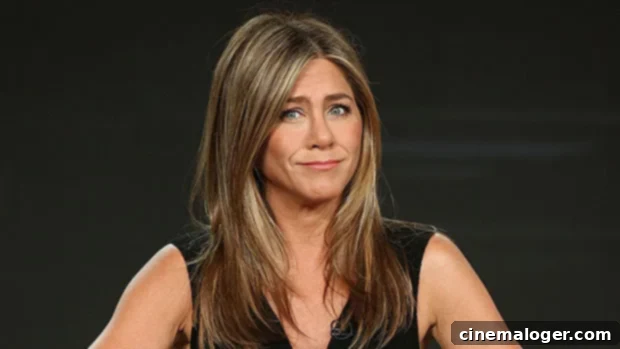Jennifer Aniston Sparks Debate: Why the Star Cut Unvaccinated Friends for Public Health and What It Means
In an era defined by global health crises and intense public scrutiny, celebrity voices often amplify critical societal conversations. Beloved actress Jennifer Aniston, 52, found herself at the center of a significant public debate after candidly sharing her decision to distance herself from friends who refused to get vaccinated against COVID-19. Her stance quickly garnered both widespread support and considerable backlash, prompting the star to elaborate on her reasons and emphasize a profound message about collective responsibility.
Aniston’s revelation initially surfaced in an interview, but it was her direct response to a critic on Instagram that truly ignited the discussion. A commenter questioned her logic, stating, “But if she’s vaccinated she’s protected correct? Why be worried about unvaxxed around her? (shrugging emoji).” This query, reflective of a common misconception during the pandemic, provided Aniston with an opportunity to articulate a nuanced perspective on public health and personal ethics.
Her reply was unequivocal and rooted in a deep concern for others. Jennifer Aniston explained, “Because if you have the variant, you are still able to give it to me. I may get slightly sick but I will not be admitted to a hospital and or die. BUT I CAN give it to someone else who does not have the vaccine and whose health is compromised (or has a previous existing condition) – and therefore I would put their lives at risk. THAT is why I worry. We have to care about more than just ourselves here.” This powerful statement underscored a fundamental principle of public health: vaccination is not solely about individual protection but also about safeguarding the wider community, especially the most vulnerable members who may not be able to receive a vaccine or whose immune systems are compromised.
View this post on InstagramA post shared by Oprah Daily (@oprahdaily)
This strong clarification from Aniston came after her initial comments published in the September issue of InStyle magazine. In that interview, she revealed the difficult but firm choice she made to sever ties with individuals in her life who had “refused” to get their COVID-19 vaccine. Her candidness highlighted a personal struggle that many faced during the pandemic, forcing them to re-evaluate relationships based on differing health beliefs and perceived risks.
Aniston further articulated her frustration with those she labeled “anti-vaxxers” or individuals who “just don’t listen to the facts.” She expressed a belief that such decisions were often rooted in “fear or propaganda” rather than scientific evidence. This perspective resonated with a significant portion of the public who felt exasperated by misinformation and vaccine hesitancy, while simultaneously drawing sharp criticism from those who championed individual autonomy and questioned the efficacy of vaccines or the severity of the virus.
The Friends star also shared her personal journey through the pandemic, admitting to an intense period of news consumption that ultimately led to what she termed “news fatigue” and “panic fatigue.” She acknowledged the collective longing for hopeful news amidst a torrent of unsettling information, stating, “I’ve really had to stop [keeping CNN on too much]. We all went through news fatigue, panic fatigue, during the pandemic because we were hoping one day we would wake up and hear something hopeful, and all we got was more insanity.” This sentiment captured the exhaustion felt by millions globally, providing context for the emotional toll the pandemic took and the eventual firm stance she felt compelled to adopt.

It was against this backdrop of overwhelming uncertainty and widespread disinformation that Aniston’s resolve solidified. She then delved into the specifics of her decision regarding her social circle. “[There’s] still a large group of people who are anti-vaxxers or just don’t listen to the facts. It’s a real shame. I’ve just lost a few people in my weekly routine who have refused or did not disclose [whether or not they had been vaccinated], and it was unfortunate.” This statement highlighted the personal cost of differing views on vaccination, as friendships and social dynamics were profoundly impacted by the pandemic’s demands for collective action.
Aniston further elaborated on the principle she felt was at stake, stating, “I feel it’s your moral and professional obligation to inform, since we’re not all podded up and being tested every single day. It’s tricky because everyone is entitled to their own opinion — but a lot of opinions don’t feel based in anything except fear or propaganda.” This argument transcends mere personal preference, positioning vaccination status within a framework of social responsibility and communal safety. For Aniston, the right to an opinion did not outweigh the ethical duty to protect others, particularly when opinions were perceived to be fueled by unfounded fears or misleading narratives.
Her stance sparked a broader conversation about the role of celebrities in public health discourse. As a highly influential figure, Aniston’s words carry significant weight, and her decision to speak out put a spotlight on the divisive nature of vaccination. While some lauded her for using her platform to advocate for public health, others criticized her for potentially alienating friends and contributing to a polarized environment. The debate underscored the complex interplay between individual liberty, public safety, and the personal choices that shape our relationships and communities.
Ultimately, Jennifer Aniston’s decision and subsequent explanation served as a potent reminder of the profound impact of COVID-19 on personal lives and social bonds. Her articulation of “caring about more than just ourselves” resonated with many who felt a strong collective responsibility during the pandemic. It forced a societal reflection on how personal choices, particularly concerning public health, extend beyond the individual and profoundly affect the well-being of those around us. Her unwavering position continues to be a point of reference in discussions about health mandates, social responsibility, and the evolving nature of personal relationships in a post-pandemic world.
